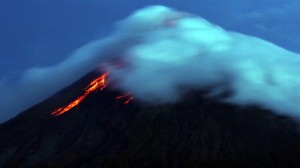
Lava flows from the crater of Mayon volcano seen from Legazpi City, Albay province, on Sept. 17, 2014. AFP FILE PHOTO
LEGAZPI CITY, Philippines – After a lull of almost two weeks, volcanologists reported that a dim crater glow was seen in Mayon Volcano on Wednesday night.
The Intensity 1 crater glow indicates that there is hot material near the crater, according to Renato Solidum, director of the Philippine Institute of Volcanology and Siesmology (Phivolcs).
“The ground deformation survey indicated that there’s magma ascending at the crater. The crater glow may indicate that there’s a magma or gas extruding. But usually it is magma that creates glow. If it is new magma, the glow will possibly intensify,” he said in a briefing here Thursday.
In its bulletin released Thursday, Phivolcs recorded the sulfur dioxide (SO2) emitted at the crater at 476 tons per day on November 5, which meant it was near the 500 tons per day baseline level during normal period.
Eduardo Laguerta, Phivolcs resident volcanologist here, said the sulfur flux possibly meant that either the magma was poorly degassing because of the clogged crater or the magma was still the old deposits of previous year’s eruption, the reason why the gas emission was low.
Amid recent lull in the movement of the volcano, authorities have allowed residents beyond the 6-kilometer permanent danger zone (PDZ), or those from the 7-8 km extended danger zone, to return home.
They represent about 70 percent of the 54,000 individuals who were evacuated since Sept. 15 after alert level 3 was raised over Mayon Volcano, indicating an imminent eruption.
About 15,000 individuals from 2,898 families who live within the 6-km PDZ were however required to remain in evacuation centers located in the towns of Malilipot, Daraga, Camalig and Guinobatan and the cities of Tabaco and Ligao.
RELATED STORIES
Go home, some Mayon evacuees told
Mayon Volcano on soft eruption, lava seen